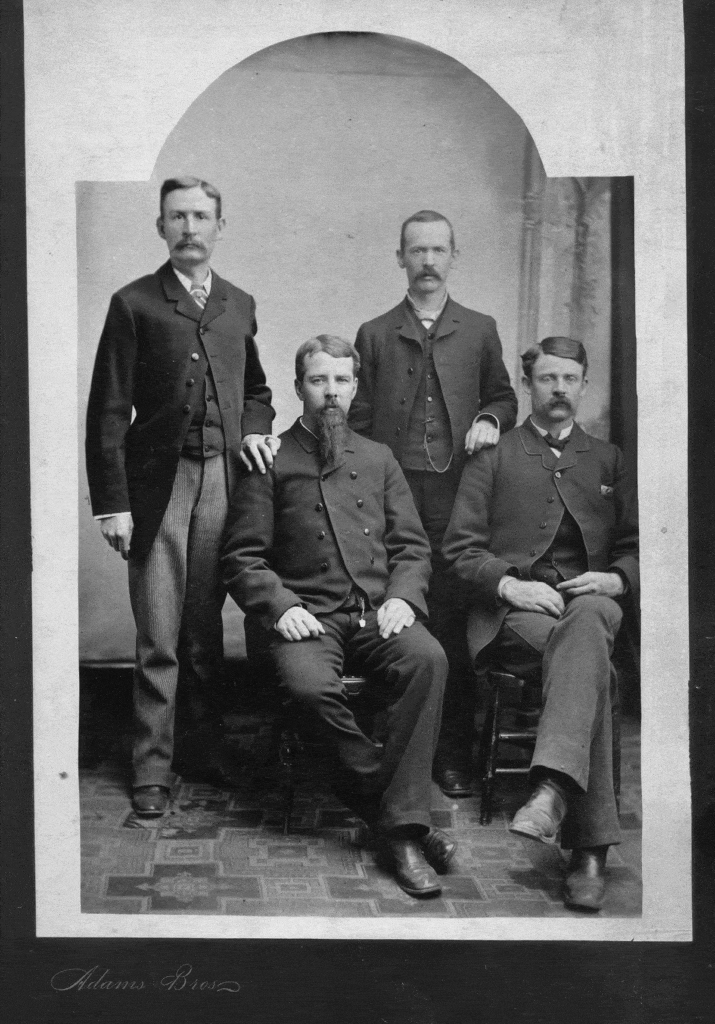Though Park City was small when it was incorporated in 1884, its politics were lively. Park City’s first municipal elections took place on May 5th, 1884, and they featured contests to select Park City’s first mayor, treasurer, police justice, and aldermen.
The May elections were preceded by a City Convention only two weeks earlier, on April 24th, during which a number of delegates gathered from around Park City to nominate men for these offices. Delegates put forward three Parkites for mayor: David C. McLaughlin, Fred W. Hayt, and Edwin Kimball.[i] These nominations were extraordinarily prescient; all three nominees would go on to become prominent local politicians, with all three becoming members of Utah’s Liberal Party, a late-19th century anti-Mormon party which frequently clashed with the pro-Mormon People’s Party.[ii] [iii] In the end, the Convention chose to nominate McLaughlin for mayor, after he won a whopping 90% of the delegates’ twenty-one votes; Hayt received the remainder, while Kimball received none.[iv]

Credit: Park City Historical Society & Museum, David Keith III Collection
McLaughlin, along with the candidates that the Convention had nominated to fill Park City’s other municipal offices, contested the May 5th election as the “regulars,” one of the two provisional political parties that the Park Record would identify as competitors in Park City’s first election.[v] Though all these “regular” candidates had easily won the support of the Convention, they were challenged by the “Independents,” led by Hayt, who sought a rematch against McLaughlin at the ballot box.[vi] Also numbering amongst the “Independents” was Frank E. James, who was running for the office of police justice despite having likewise been defeated at the Convention by “regular” nominee Thomas Cupit.[vii]
Despite Hayt and James’ earlier defeats at the hands of McLaughlin and Cupit, respectively, they emerged victorious after votes were counted: Hayt won 275 votes for mayor to McLaughlin’s 194, and James won by an even larger margin, with 303 votes for police justice to Cupit’s mere 163.[viii]
Though a “regular” was elected to the office of treasurer, and all three elected aldermen came from McLaughlin’s camp, the voting population of Park City (which included Park City’s women, thanks to Utah’s early extension of the right to vote) had rejected the Convention’s choices for mayor and police justice, and Hayt was inaugurated as Park City’s first mayor a few days later.[ix] Though McLaughlin would remain active in local politics after this election, and would eventually go on to serve as a Liberal in the Utah State Legislature, he would never hold the office of mayor.[x]
Edwin Kimball, on the other hand, would be elected to replace Hayt in the mayoral office only one year later, in 1885, recovering from his terrible performance at the original City Convention, when zero delegates voted to nominate him to the office.[xi] Thus, although McLaughlin won the support of the Convention’s delegates so decisively in April 1884, only his opponents, Hayt and Kimball, would go on to actually become mayors of Park City.
[i] “The City Convention,” Park Record, April 26, 1884, 4, https://newspapers.lib.utah.edu/ark:/87278/s6st8rzm.
[ii] “Summit County,” Ogden Herald, August 7, 1885, 3, https://newspapers.lib.utah.edu/ark:/87278/s6zc93pm.
[iii] “Liberal County Convention,” Park Record, October 4, 1884, 4, https://newspapers.lib.utah.edu/ark:/87278/s6ff4vg5.
[iv] “City Convention,” 4.
[v] “The First Election,” Park Record, May 10, 1884, 4, https://newspapers.lib.utah.edu/ark:/87278/s6dn577q.
[vi] Ibid.
[vii] Ibid.
[viii] Ibid.
[ix] Ibid.
[x] “D. C. M’Laughlin Dead,” Salt Lake Tribune, June 19, 1901, 8, https://newspapers.lib.utah.edu/ark:/87278/s6hq58sx.
[xi] “Park City Election,” Salt Lake Herald-Republican, May 6, 1885, 8, https://newspapers.lib.utah.edu/ark:/87278/s62n67tm.